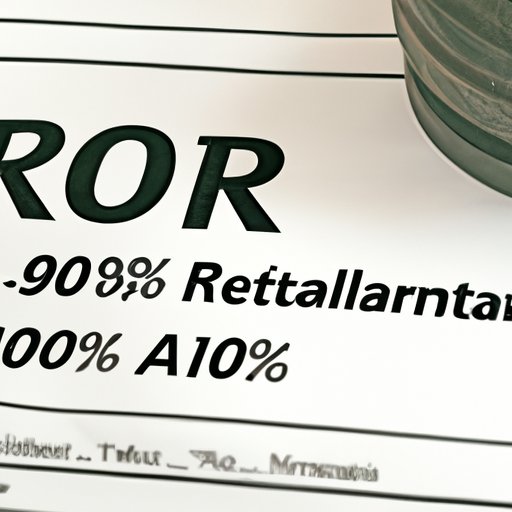401(k) vs. Roth IRA: Which is Better for You?
Planning for retirement is essential for everyone who wishes to have a stable future. Investing in a retirement savings account is one of the most effective ways to achieve this goal. There are many different types of accounts to choose from, including 401(k) and Roth IRA. Understanding the difference between these two types of accounts is essential in selecting the one that best suits your situation. In this article, we’ll explore the pros and cons of investing in a 401(k) and Roth IRA, highlight investment goals, investment horizons and asset allocation, and personal experiences. After reading this, you should be able to make an informed decision about which account best fits your retirement needs.
Comparison Analysis
A 401(k) and Roth IRA both offer tax advantages. However, they have different eligibility requirements, contribution limits, and withdrawal rules. To start, 401(k) is an employer-sponsored retirement account that allows employees to set aside a portion of their pre-tax income. In contrast, a Roth IRA is an individual retirement account where contributions are made with after-tax dollars.
One significant difference between a 401(k) and Roth IRA is eligibility. A 401(k) is only available to individuals who are employed by a company that offers it. In contrast, a Roth IRA has more lenient requirements and is available to anyone who earns an income.
Another difference to consider is contribution limits. For a 401(k), the contribution limit per year is $19,500 in 2021, and individuals aged 50 or over can make an additional catch-up contribution of $6,500. In contrast, Roth IRA contributions are limited to $6,000 in 2021, and individuals aged 50 or over can make an additional catch-up contribution of $1,000.
Withdrawal rules also differ between these two types of accounts. A 401(k) requires withdrawals to begin at age 72, while Roth IRA owners face no requirement to withdraw funds at any age. Furthermore, withdrawals from a 401(k) are taxed as income, while Roth IRA withdrawals are tax-free at retirement.
Pros and Cons
Each account has its pros and cons. Understanding them can help determine which works best for you.
One of the significant advantages of a 401(k) is the employer’s matching contribution. In this situation, an employer contributes a certain amount of money to an employee’s account, matching a percentage of their contribution. Additionally, 401(k) contributions reduce an individual’s current taxable income, which means you will pay fewer taxes upfront. However, contributions to a 401(k) are taxed when you withdraw them during retirement.
A Roth IRA, on the other hand, taxes contributions upfront. This means you pay taxes on the funds you invest, but you won’t have to pay taxes when you withdraw it upon retirement. Moreover, because it’s an individual retirement account, you will have more flexibility in choosing where to invest your money.
However, one significant drawback of investing in a Roth IRA is the contribution limit. It is lower than a 401(k), which means you will not be able to save as much money in it annually. Additionally, you will get no tax deductions for contributions to the account.
Investment Goals
Choosing the right investment account depends on your investment goals. For those who want tax breaks now, a 401(k) is the better choice. You will pay no taxes upfront on your contributions, potentially giving you some breathing room on your taxed income. On the other hand, for those who desire tax-free withdrawals, a Roth IRA is the way to go. With no requirement to withdraw funds and tax-free withdrawals upon retirement.
Investment Horizons
Investment horizon refers to a person’s timeline for reaching their financial goals. It’s crucial to consider investment horizons when choosing between a 401(k) and a Roth IRA. Younger investors may find a Roth IRA more appealing because they have more time for contributions to grow with the account’s tax advantages. Conversely, individuals closer to retirement may see 401(k) as a better investment option because of its tax-breaks now.
Additionally, when considering an investment’s length, it’s essential to think about your current income and tax bracket. Those whose income bracket decreases in retirement will benefit from 401(k) for its tax benefits upfront. But those whose income bracket increases during retirement could benefit from Roth IRA because withdrawals are tax-free.
Consider Asset Allocation
One of the essential factors to consider when deciding between a 401(k) and Roth IRA is your investment’s asset allocation. Roth IRA has more flexibility with investment options and can participate in riskier or less predictable investments like real estate, stocks, mutual funds, and more. Therefore, someone who wants to invest in these types of assets may find roth IRA more suitable. On the other hand, a 401(k) is traditionally invested in different mutual funds and index funds, which are more conservative investment options.
Personal Experiences
Consider a colleague’s experience who invested in a Roth IRA or 401(k) to get a better understanding of how they work and for insights on how to make the best use of these investment vehicles. These experiences can help in decision-making, putting everything into context and adding confidence for the direction you want to go.
Conclusion
Deciding between a 401(k) and Roth IRA depends on various factors, such as investment goals, investment horizons, asset allocations, and personal experience. One may find the 401(k) more attractive for its tax breaks upfront, while another may prefer the Roth IRA for tax-free withdrawals. Take some time to understand what each investment vehicle offers, and most importantly, identify what best suits your needs.
